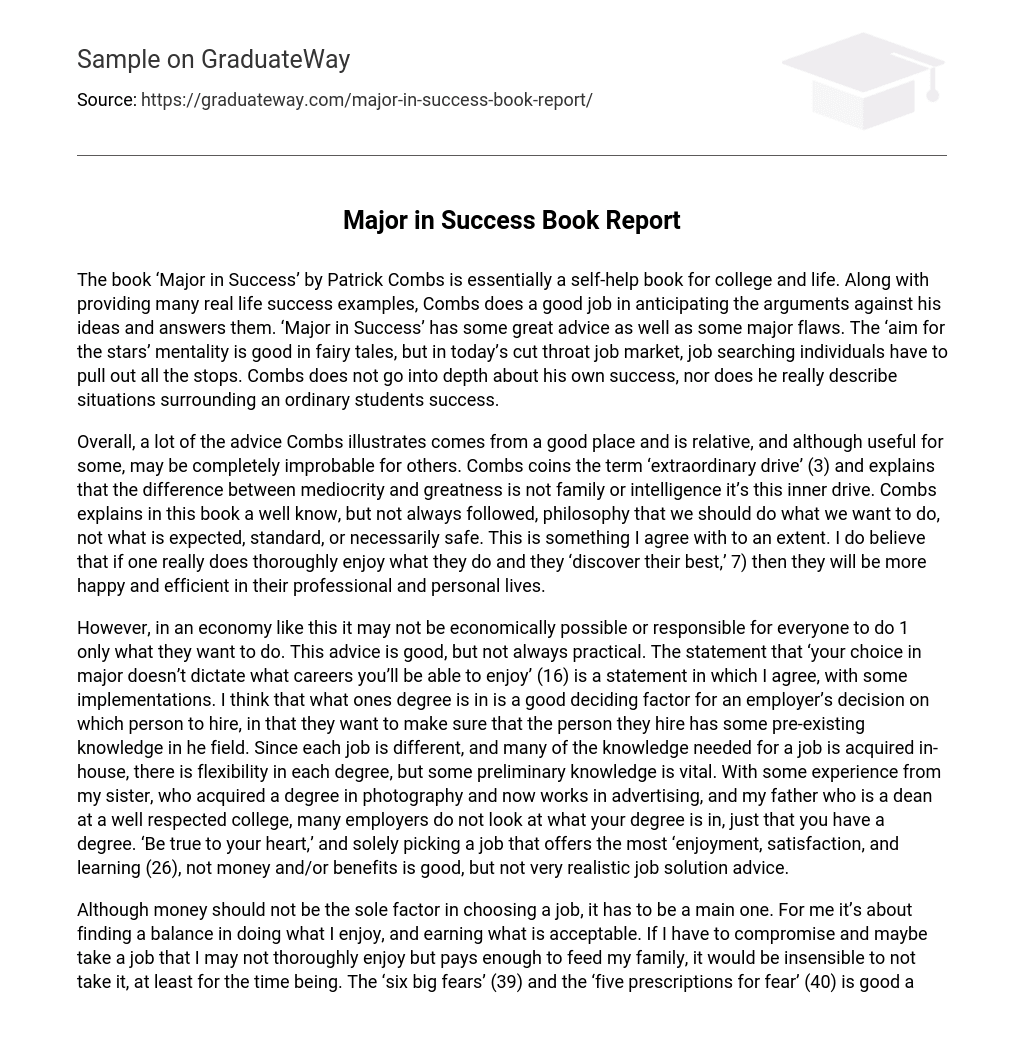The book ‘Major in Success’ by Patrick Combs is essentially a self-help book for college and life. Along with providing many real life success examples, Combs does a good job in anticipating the arguments against his ideas and answers them. ‘Major in Success’ has some great advice as well as some major flaws. The ‘aim for the stars’ mentality is good in fairy tales, but in today’s cut throat job market, job searching individuals have to pull out all the stops. Combs does not go into depth about his own success, nor does he really describe situations surrounding an ordinary students success.
Overall, a lot of the advice Combs illustrates comes from a good place and is relative, and although useful for some, may be completely improbable for others. Combs coins the term ‘extraordinary drive’ (3) and explains that the difference between mediocrity and greatness is not family or intelligence it’s this inner drive. Combs explains in this book a well know, but not always followed, philosophy that we should do what we want to do, not what is expected, standard, or necessarily safe. This is something I agree with to an extent. I do believe that if one really does thoroughly enjoy what they do and they ‘discover their best,’ 7) then they will be more happy and efficient in their professional and personal lives.
However, in an economy like this it may not be economically possible or responsible for everyone to do 1 only what they want to do. This advice is good, but not always practical. The statement that ‘your choice in major doesn’t dictate what careers you’ll be able to enjoy’ (16) is a statement in which I agree, with some implementations. I think that what ones degree is in is a good deciding factor for an employer’s decision on which person to hire, in that they want to make sure that the person they hire has some pre-existing knowledge in he field. Since each job is different, and many of the knowledge needed for a job is acquired in-house, there is flexibility in each degree, but some preliminary knowledge is vital. With some experience from my sister, who acquired a degree in photography and now works in advertising, and my father who is a dean at a well respected college, many employers do not look at what your degree is in, just that you have a degree. ‘Be true to your heart,’ and solely picking a job that offers the most ‘enjoyment, satisfaction, and learning (26), not money and/or benefits is good, but not very realistic job solution advice.
Although money should not be the sole factor in choosing a job, it has to be a main one. For me it’s about finding a balance in doing what I enjoy, and earning what is acceptable. If I have to compromise and maybe take a job that I may not thoroughly enjoy but pays enough to feed my family, it would be insensible to not take it, at least for the time being. The ‘six big fears’ (39) and the ‘five prescriptions for fear’ (40) is good advice and excellent self motivators as well. All of the fears, from the fear of poverty to the fear of failure, are all fears that I have now and have regarding my future.
The prescriptions are good advice to help aid these doubts and illustrate the epitome of self-help. My only quarrel is that I wish Combs wrote more about real life examples from ordinary people and how these 2 prescriptions ‘cured’ their fears. The chapter on studying abroad, ‘Great Escapes,’ does a good job in explaining the benefits of working abroad, and how to go about it. Combs does however fail to mention the cons and troubles that can go along with working in another country other than one’s own. Chapters 9, 15, and 20 offer good advices on lines for ones resume, how to do research n jobs/industries, advice for interviews, and how to conduct an interview plan. One major disagreement I have with chapter 9 is how this chapter puts a high emphasis on campus clubs and volunteer programs. Although they do look good on a resume, I do not feel they are as crucial in obtaining a job as the author entails. One major disagreement that I have with Combs comes from chapter 10, ‘Never Mind the Grades. ’
In it, Combs gives many reasons and examples of how and when ones GPA did not matter. He fails to mention that in a very competitive job market when all of the applicants ave similar factors, it will likely be GPA factor that makes the difference. Another major disagreement comes from chapter 19, ‘School without an Internship Will Get You Nowhere. ’ Although Combs does provide statistics, and I do agree that an internship can be essential, to put the idea out there that a lack of an internship will lead to a lack of success is absurd. Overall the book ‘Major in Success’ by Patrick Combs is an interesting book that does provide good opinions backed up by some facts. I do believe however that many of the statements in this book are all relative and do not apply to everyone.





